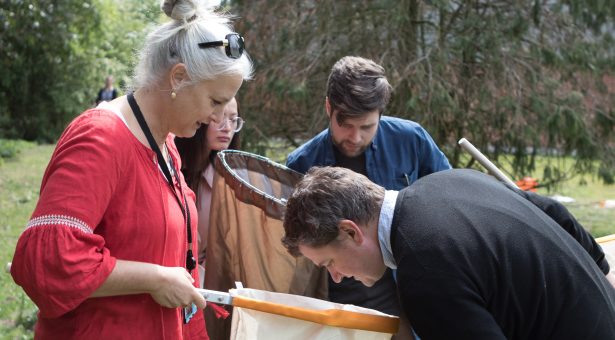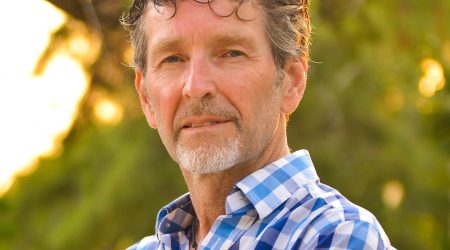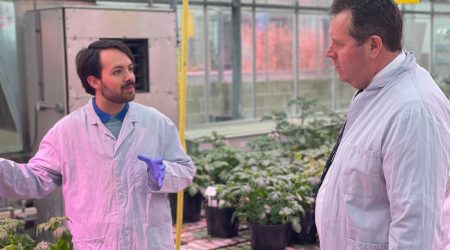From PhD to policy; one student’s career path

After four years endeavour, Nicola Capstaff has just submitted her PhD thesis.
She became interested in policy during her studies and has sought out opportunities to learn more about the interface between research and policy. We asked her what was her experience, and what she wants to do next?
“I have been working on a research project that looked at nitrogen use efficiency in UK forage crops, as a BBSRC iCASE studentship in association with the British Association of Green Crop Driers (BAGCD).
I was introduced to the different policies that affect the industry, in particular policies which impact on fertiliser use, as part of the project alongside traditional lab research and field trials.
Fertilisers are used extensively around the world. Farmers use high levels of fertiliser in a bid to maintain crop yields, in the face of losses through plant nutritional problems and diseases.
However, excess forage crop fertilisation is inefficient, as the crops are often unable to use the additional fertiliser added. Therefore, with this current approach, not only is there a high cost for a small improvement in yield, but other negative effects with fertiliser use can occur. For example, excessive fertilise application has been shown to change soil acidity, which degrades soil quality and can impact on biodiversity.
Furthermore, excessive fertiliser use means not all of what you apply is taken up by the plants, you also get leaching of the fertiliser. This fertiliser can run off the field and enter water courses, like rivers, which affects the ecosystem through processes such as eutrophication, and ultimately may end up in the drinking water supply of towns and cities.
Researching fertiliser use, alongside relevant, UK and EU policy, I realised that I want to use my PhD to pursue a career in science-based policy, rather than an academic research career.
I was fortunate to gain experience for this career transition with the BRIGIT consortium led by the John Innes Centre.
The aim of BRIGIT is to improve UK preparedness for the potential arrival of the plant pathogen, Xylella fastidiosa. The consortium’s research goals are to study the public’s awareness, biology, and epidemiology of Xylella fastidiosa and it has built collaborative relationships with researchers across 12 leading UK institutes.
Of particular interest to me is that BRIGIT’s research goals have been developed alongside policymakers. It is a project funded by UK Research and Innovation through the Strategic Priorities Fund, by a grant from the Biotechnology and Biological Sciences Research Council with support from the Department for Environment, Food and Rural Affairs and the Scottish Government.
From the early stages of proposal planning, researchers and government have worked together to develop BRIGIT’s research strategy. This means that the research outputs will provide scientific evidence tailored exactly to meet the policy needs of UK policy makers, thereby protecting the country from the risks posed by Xylella and improving our capability to respond to any potential outbreak.
During my time working on BRIGIT I have experienced this unusual but highly effective science-policy discourse first-hand. I attended a BRIGIT-policy-maker workshop in September, a forum for knowledge exchange between researchers and policymakers. Researchers presented their latest research outputs to government officials from across the UK and together strategies were identified for future work using insight into governments’ policy and operational needs.
Additionally, attendees examined the best way for researchers to deliver updates of scientific knowledge to government, and I have been drafting a policy statement accompanied by a timeline of research outputs to inform directly the governments’ responses to Xylella.
This experience has involved engagement with multiple stakeholders to plan and prioritise the goals of the project. It has also greatly increased my own understanding of knowledge exchange between science and policy.
This knowledge exchange is possible as science and policy are increasingly closely aligned. There is an expectation that policy makers use evidence-based approaches and therefore a demand for the most accurate and up to date scientific knowledge. I believe that working at the science-policy interface is one way a scientist can make the biggest difference to society.
In the civil service, policy officials need to brief ministers on current policy issues, or those on the horizon. Often, officials will be tasked with pulling together huge amounts of complex data from scientific literature into a report that not only explains the evidence but summarises clearly and concisely the potential impact on the UK. These reports may inform government policy, regulation or public awareness campaigns.
When I was young, I knew I wanted to do something vaguely science related, so I went to Leeds University and undertook a straight biology degree. In my second year, I started to do some scientific research placements with summer studentships in Leeds and Cambridge, and a year-in-industry placement in Durham. By the end of my degree I had the bug for research, so I decided to apply for a PhD.
It’s only through going through the amazing experience of doing a PhD and, more recently working on BRIGIT, that I have realised just how many scientific careers are out there.
Along the way, I’ve also realised that there’s a difference between science (the knowledge) and research (the process of acquiring that knowledge). I’m excited to try something new, and something which allows me to use my science and my understanding of research but is not sat at a lab bench pipetting. That’s not to say I haven’t enjoyed being at the bench, however after seven years in the lab I am ready to try something new.
Some people are now surprised that I want to move out of research and into policy. There is a difference between a science-career and a research-career. By pursuing a career in policy, I will still be aligned to science, but I will develop new skills, tools, and experiences, different to those that I found in research.”



